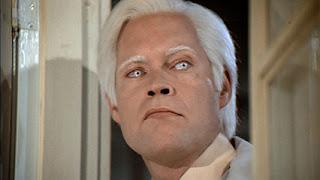Werth: Hello, Wise.
Wise: I see you've donned a fright wig.
Werth: I thought it was the least I could do to honor the passing of film and television comedienne Phyllis Diller.
Wise: Just don't start calling me "Fang."
Werth: Diller wasn't really that big a movie star, but she definitely gave women a presence in the comedy culutre that helped those who came after her become silver-screen laugh queens.
Goldie Hawn could have been just another pretty face, but in 1968 she proved on TV's Rowan & Martin's Laugh-In that she could take the dumb blonde routine to a new level.
Wise: It takes a special talent to round up belly laughs with just a giggle and a bikini.
Werth: While still performing on Laugh-In, Hawn jumped into the movie pool and almost immediately won an Oscar for her role in Cactus Flower (1969). That success was followed by second-billing in There's a Girl in My Soup (1969) and $ (1970) until 1972 when she became the top-billed actress in hits like Butterflies Are Free and The Sugarland Express (1974).
After playing second-fiddle to stars like Warren Beatty (Shampoo (1975)) and George Segal (The Duchess and the Dirtwater Fox (1976)), Hawn would return to the first position in 1978 with the mega-hit comedy/thriller Foul Play.
Wise: Not to mention Overboard (1987).
Werth: Foul Play is basically a romatic comedy homage to mystery-thrillers with some obvious tips of the cap to Hitchcock classics Vertigo, Dial M for Murder and The Man Who Knew Too Much. Hawn plays divorced librarian Gloria Mundy who decides to try and be more outgoing by picking up a hitchhiker on her drive back to her home in San Francisco.
Wise: I know picking up total strangers always makes me loosen up.
Werth: Unfortunately this hitchhiker winds up being murdered, tossing Gloria into an intrigue-filled plot to assassinate the Pope involving a man with a scarred face, a scary albino named Whitey, and a hitman known as "The Dwarf."
Wise: I assume he busts kneecaps.
Werth: Gloria's knight in corduroy armor is disgraced detective Tony Carlson (the almost lecherous Chevy Chase), who seems to be spending more time wooing Gloria than figuring out how to stop the assassination.
And rounding out this randy cast is Dudley Moore in his breakthrough American performance as diminutive perv, Stanley Tibbets. The film isn't as whacky as a Marx Brothers movie nor as action-filled as a Lethal Weapon. Underscored by a sappy Barry Manilow tune, Foul Play takes a really comfortable middle-of-the-road route bewteen comedy and thrills and creates a satisfying, but not altogether transcendant experience.
Its charm emanates from its lead, with Hawn taking her dumb blonde act to more palatable levels by putting her in situations where she's not dumb—she or the person she's talking to just doesn't know what the other person is talking about.

It leads to a comedy of misunderstandings that allows for such fun moments as a Burgess Meredith vs. Rachel Roberts karate fight and a multi-car race across San Francisco. All-in-all Foul Play isn't foul at all, playing coy at a time when having an old lady use the F-word in a Scrabble game was risqué comedy.
Wise: Comediennes don't have to be dumb blondes to be successful at comedy. In fact, being a fast-talking, savvy brunette can also lead to big laughs. Rosalind Russell hit it big in screwball hits like His Girl Friday (1940) and The Feminine Touch (1941), but it is her performance in Auntie Mame (1958) that has become perhaps her most iconic comedic performance.
Werth: I know you weren't going to continue without mentioning her side-splitting turn in 1939's The Women.
Wise: Of course not. Based on the novel by Patrick Dennis (actually a fictionalized memoir of author Edward Everett Tanner III's nom de plume), Auntie Mame presents the life of orphaned, ten-year-old Patrick once he goes to live with his bohemian aunt Mame Dennis (Russell).
Mame's outsize personality transforms the sober little boy, and eventually comes to the rescue when Patrick's Ivy League education threatens to pair him up with a shallow, social climbing bride (Joanna Barnes deploying a really top drawer Locust Valley lockjaw).
Werth: One of my favorite scenes is when Mame gives the Upsons the what for.
Wise: Surrounded by a cadre of eccentrics—Broadway doyenne and heroic tippler Vera Charles (Coral Browne); lecherous Irish poet Brian O'Bannion (Robin Hughes); Texas oilman Beauregard Jackson Pickett Burnside (Forrest Tucker)—Russell holds her own. Having originated the role on Broadway, Russell's performance has an appropriate theatricality about it, but her background in film informs the quieter moments when the camera lingers in closeup.
At its heart, this is a film about finding love, and the tenderness that Russell exhibits when she realizes how much Patrick means to her anchors the film's oddball delights.
Werth: Not to mention the eye-popping array of gowns created by Orry-Kelly.
Wise: While Russell is the chief pleasure of Auntie Mame, the film is crowded with hilarious turns by gifted actresses. Coral Browne's Vera has all the grande dame-ness of Bette Davis in All About Eve, but leavens the part with her penchant for booze. Lee Patrick's daft society matron reveals how dangerously close the suburban set is to bigotry.
But perhaps best of all is Peggy Cass as Mame's secretary Agnes Gooch. The socially awkward frump was already something of a cliché by the time Auntie Mame hit theaters, but Cass not only takes the requisite glasses, dumpy cardigan, and sensible shoes to their stereotypical heights, she also gets her very own bombshell moment when she follows Mame's exhortation to "Live! Live! Live!"
Werth: Sounds like all these funny ladies followed that good advice.
Wise: As long as we all follow the laughs to next week's Film Gab.

















No comments:
Post a Comment